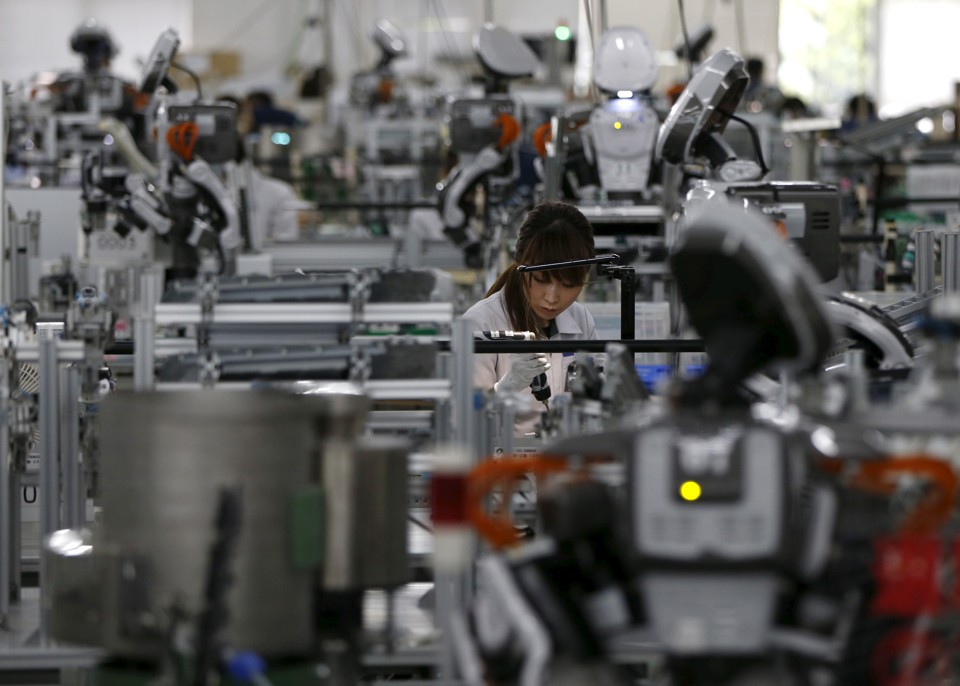The linked article below from The Atlantic, by Obama Chief economist Jason Furman, is meant to suggest that Capitalism has within itself the means to protect human participation as a viable competitive commodity. I couldn't disagree more.
Mr. Furman's argument is based on two points, first that new technology ought to be able to continue to create new skill requirements for humans because it has been able to do that so far. And secondly that the unemployment rate of a range of advanced economies is not related to technology improvements, even though participation rates of less educated white males have fallen off precipitously in the last several years; especially here.
The is argument is astonishing for both what it includes, and the way it includes it, as well as what it does not include.
First of all, the real issue at present isn't just the risk of replacing humans, but what the potential ability to do so does to what human skill can expect to demand in return for its services. Put another way, humans are now simply competitors with their wage expectations limited by the current costs of applying automation of various sorts. And make no mistake, that has been a part of keeping wages down, but that is not the only competitor workers here face. Because capital can move so quickly, and output can be moved so efficiently anywhere, other workers in the world labor market are also there to limit wage expectations, as well as to undercut them completely. Which, in itself, is why so much of our unemployment hasn't necessarily been related to domestic technological inputs. One would also have to factor in the trade agreements we have made with the rest of the world that many, if not most, of the other advanced economies have not done. Trade agreements that make foreign production advantageous for reasons other than labor costs.
This then begs the question: what good is it to have a job if wages have to be constrained by the cost of not only other workers in less advanced economies, but also the cost of applying automation? Does the trend of ever better automation, where setup costs are sure to improve, just as the ranges of applications do, bode well for the prospects of a living wage; even for the jobs of middle, and upper middle, tier education levels?
The fact of the matter is that it's not just that "disruption" has a chance to totally change what software can do, that it can't presently do, but that, as we progress in better software, the ability to be paid commensurate with a healthy life, let alone consume to the degree that ever increasing production requires, becomes unbelievably more problematic than it already is.
Then we come to this whole notion of "retraining." Education costs are already soaring. Just imagine how things are going to be when the rate of technological change goes through several more iterations of increase. As it stands now, in any one lifetime, a person might reasonably expect the need to retrain once, or twice at the extreme. In a decade or two what might that be? Two to three times? Three to four times? Who can say. And even if the human psyche could be made to handle this without going insane, who's going to continue paying for it? We've already seen what might be likely for living wages. Do you think those left making decent money are going to foot the bill in increased taxes? Do you think corporate America, already struggling with hyper competition around the globe, is going to any more receptive to new taxation?
There is also one other thing we have to remember here, already alluded to when I mentioned being paid enough to continue consuming what we are capable of producing.
When manufacturing was still predominate here, factories were well suited to employing large numbers of people; something commensurate with the increases in production they represented. The more technical we become, however, and the more software is able to do to assist the technical leaders amongst us, the fewer people that will be needed to apply the technology. That is, after all, the whole point of better productivity isn't it? And you can be damn sure that if a producer doesn't maximize doing more with less, the world market will punish them appropriately.
Keeping that trend in mind, let us also consider where global population is heading. Always are there going to be more and more people looking for some way to create that abstract we call money. What will be done with them? Will mass die offs become just another factor in euphemisms like "economic pain" to be born? Aren't there signs we're getting there already?
Capitalism is obsolete. It is so precisely because of technological change. Trying to suggest that it can use the techniques that have rendered it so to save it is ludicrous. Anybody trying to say otherwise has a vested interest only in keeping things the way they are this quarter, and maybe one or two more down the road; the current structure of who pays and who benefits. It's been working, more or less, for the last bunch of quarters after all. What could possibly go wrong with that view point?

How to Protect Workers From Job-Stealing Robots
President Obama’s chief economist argues that, with the right policies, artificial intelligence can be boon to the labor market, not a threat.
No comments:
Post a Comment